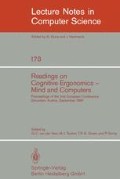Abstract
This paper analyses the situation in which a beginning computer user tries to handle a computer system by only having had a brief period of instruction and manned with a manual. The situation is analysed as a problem solving situation, in which knowledge about how similar tasks are handled outside of the system plays a great role. It is suggested that the following situations will lead to slow learning: when the problem space is great, when necessary methods are difficult to access, when prior methods are inadequate and strong, when prior models are inadequate, and when the problem formulation is misleading. It is further suggested that the following may be learned in this situation: situation specific goal-condition-method rules, higher order rules, problem schemata, and causal explanations.
Empirical observation by means of think aloud protocols and registering of actual interactions are presented. These show that difficulties encountered by beginning users may be interpreted as suggested above. As to the learning content, the observations suggest that beginning users primarily learn situation specific goal-condition-method rules. They may furthermore redefine old or create new problem schemata. Higher order rules and causal explanations were not evident in the data collected.
Preview
Unable to display preview. Download preview PDF.
References
Anderson, J.R. (1982). Acquisition of Cognitive Skill. Psychological Review, 89, 369–406.
Askwall, S. (1984). Computer supported reading vs reading text on paper. FOA-report, No. D 53018. Also accepted for publication in International Journal for Man-Machine Studies.
de Bachtin, O. (1984). It is what it's used for. Paper to be presented at the first IFIP conference on Human-Computer Interaction, London.
Baladi, P. (1983). Inlärning av ett ordbehandlingssystem (VIDED). (Learning of a word processing system (VIDED)). B.A. thesis, Department of Psychology, University of Stockholm.
Barnard, P.J., Hammond, N.V., Morton, J and Long, J. (1981). Consistency and compatibility in command languages. International Journal of Man-Machine Studies, 15, 87–134.
Card, S.K., Moran, T.P. and Newell, A. (1983). The Psychology of Human-Computer Interaction. Lawrence Erlbaum, Hillsdale, New Jersey.
Halasz, F. and Moran T.P. (1982). Analogy considered harmful. Proceedings from the CHI '82 Conference: Human Factors in Computing Systems. ACM.
Halasz, F.G. and Moran, T.P. (1983). Mental models and problem solving in using a calculator. Proceedings from the CHI '83 Conference: Human Factors in Computing Systems. ACM.
Kieras, D.E. and Polson, P.G. (1982). An outline of a theory of the user complexity of devices and systems. Project on User complexity of devices and systems. Working Paper No. 1. University of Arizona and University of Colorado.
Kieras, D.E. and Polson, P.G. (1982). An approach to the formal analysis of user complexity. Project on User complexity of devices and systems. Working Paper No. 2. University of Arizona and University of Colorado.
Kintsch, W. and Greeno, J.G. (1982). Understanding and solving word arithmetic problems. Technical Report, Department of Psychology, University of Colorado.
Linde, L. and Waern, Y. (1984). On search in an incomplete database. FOA-report. (in press).
Maier, N.R.F. (1931). Reasoning in humans. II. The solution of a problem and its appearance in consciousness. Journal of Comparative Psychology, 12, 181–194.
Mayer, (1975). Different problem-solving competencies established in learning computer programming with and without meaningful models. Journal of Educational Psychology, 67, 725–734.
Mayer, R.E. (1981). The psychology of how novices learn computer programming. Computing Surveys, 13, 121–139.
Moran, T.P. (1981). The command language grammar: a representation for the user interface of interactive computer systems. International Journal of Man-Machine Studies, 15, 3–50.
Moran, T.P. (1983). Getting into a system: External-internal task mapping analysis. Proceedings form the CHI '83 Conference: Human Factors in computing Systems, The Association for Computing Machinery, 45–49.
Newell, A. (1973). Production system: Models of control structures. Visual information processing. Chase W.G. (Ed.). Academic Press, New York.
Newell, A., Simon H.A. (1972). Human problem solving. Englewood Cliffs, New Jersey.
Norman, D.A. (1982). Five Papers on Human-Machine Interaction. Report NO. CHIP-112-TR-ONR-8205.
Payne S.J., Green, T.R.G. (1983). The user's perception of the interaction language: A two-level model. Proceedings from the CHI '83 Conference: Human Factors in Computing Systems, The Association for Computing Machinery, 202–206.
Reisner, P. (1982). Formal grammar as a tool for analysing ease of use: some fundamental concepts. Human Factors in Computer Systems. Thomas H.J. and Schneider M. (Eds). Ablex.
Rumelhart, D.E., Ortony, A. (1977). The representation of knowledge in memory. Schooling and the acquisition of knowledge. Anderson, R.C., Spiro, R.J. and Montague W.E. (eds). Lawrence Erlbaum. Hillsdale, New York.
Sääf, J. (1984). Can experience be a disadvantage in computer programming. A study of the problem solving approaches of experienced an inexperienced programmers. B.A. thesis. Department of Psychology, University of Stockholm.
Waern, Y (1983). Prior knowledge as obstacle and help in computer aided tasks. Working Papers from the Cognitive seminar, Department of Psychology, University of Stockholm. No. 17.
Waern, Y. (1984). Learning computerised tasks as related to prior task knowledge. Manuscript, submitted for publication.
Author information
Authors and Affiliations
Editor information
Rights and permissions
Copyright information
© 1984 Springer-Verlag Berlin Heidelberg
About this paper
Cite this paper
Waern, Y. (1984). On the implications of users' prior knowledge for human-computer interaction. In: van der Veer, G.C., Tauber, M.J., Green, T.R.G., Gorny, P. (eds) Readings on Cognitive Ergonomics — Mind and Computers. Lecture Notes in Computer Science, vol 178. Springer, Berlin, Heidelberg. https://doi.org/10.1007/3-540-13394-1_12
Download citation
DOI: https://doi.org/10.1007/3-540-13394-1_12
Published:
Publisher Name: Springer, Berlin, Heidelberg
Print ISBN: 978-3-540-13394-0
Online ISBN: 978-3-540-38944-6
eBook Packages: Springer Book Archive

